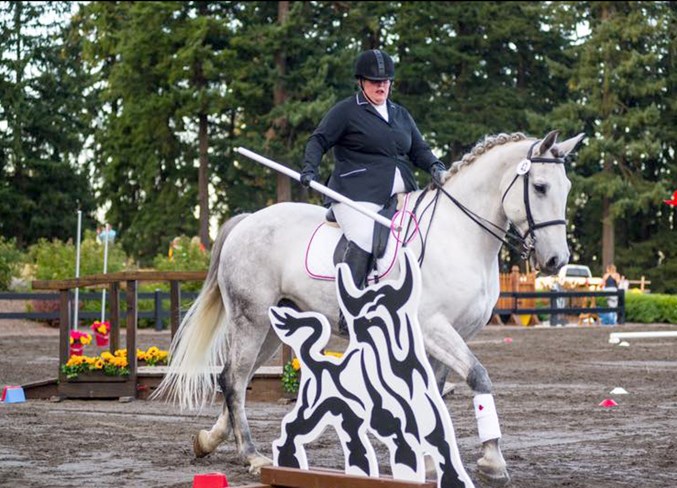An upcoming horse show and clinic will provide a first foray into the relatively new sport of working equitation for riders and spectators alike.
According to rider and show manager Kendra Martland, the Rocky Mountain Working Equitation Classic is set for two days of clinics, July 26 to 27, followed by two days of competition, July 28 to 29, at the Cochrane and District Agricultural Society. Martland said the event offers a great way for newcomers to participate in the sport for the first time, or simply watch and learn more.
“I think as long as someone comes and watches, they’re hooked right away,” she said.
Working equitation was first developed in Spain, Portugal, France and Italy to simulate the use of horses for ranch work, specifically with cattle. According to weunited.us, the first international competition was held in 1996, and in 2004, the World Association for Working Equitation was formed to govern the sport.
The sport is growing in popularity in Canada, Martland said.
“The organization – Working Equitation Canada – was started last year, so it’s fairly new in Canada,” she said. “This is our first big year of shows. It’s been in the (United) States and Australia for quite a few years now.”
A working equitation competition features four distinct phases. Individual competitors begin with a scored dressage trial, where horse and rider execute a number of movements. Competitors then participate in a scored ease of handling phase, where they are judged on their ability to smoothly navigate a series of obstacles. The final individual phase is a speed trial, where horse and rider navigate the same obstacle course, aiming to record the quickest time.
Team competitions feature a fourth trial – the cattle phase – where teams of three or four riders must sort, cut and herd a cow from the herd in the quickest time. According to Martland, competitors must complete the first three phases to be eligible for awards, and the Rocky Mountain Classic will not feature a cattle phase.
The Rocky Mountain Classic is one of three B-rated competitions in Alberta this year, alongside shows in Olds and Millarville.
Martland – who has competed in the sport for four years in North America – said her love and passion for the sport comes from its friendly and open nature. According to her, many competitors are amateur owners with a single horse.
“Anybody can compete, it doesn’t matter what discipline you ride,” Martland said. “You can show up in any tack, any type of horse. I’ve seen a pony compete, and my horse is humongous.”
Martland said the show will feature riders at the Introductory level all the way up to the Intermediate B – the third-highest attainable level in working equitation.
The two-day clinic prior to the show will allow new riders to try the sport with a two-hour ride, mostly working on the obstacle course.
“People have the opportunity to come try it first and then enter the show, and have a little bit more knowledge before they go into it blind,” Martland said.
The clinic will be coached by Oregonian Cari Schwartz, who competes in working equitation at the master’s level – the highest level in working equitation. Schwartz will also judge the competition.
“(She’s) super friendly, super knowledgeable," Martland said. "She knows more about the sport than we could ever hope to, so it should be a great opportunity for people to learn from her.”
Registration for the clinic costs $150, and is available online at workingequitationcanada.com Participants can also register for the show on the site, at a cost of $100 for Introductory riders and $150 for all other levels.



